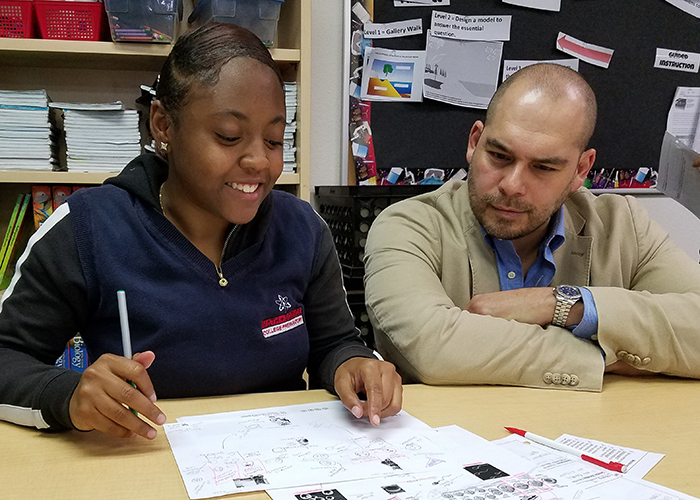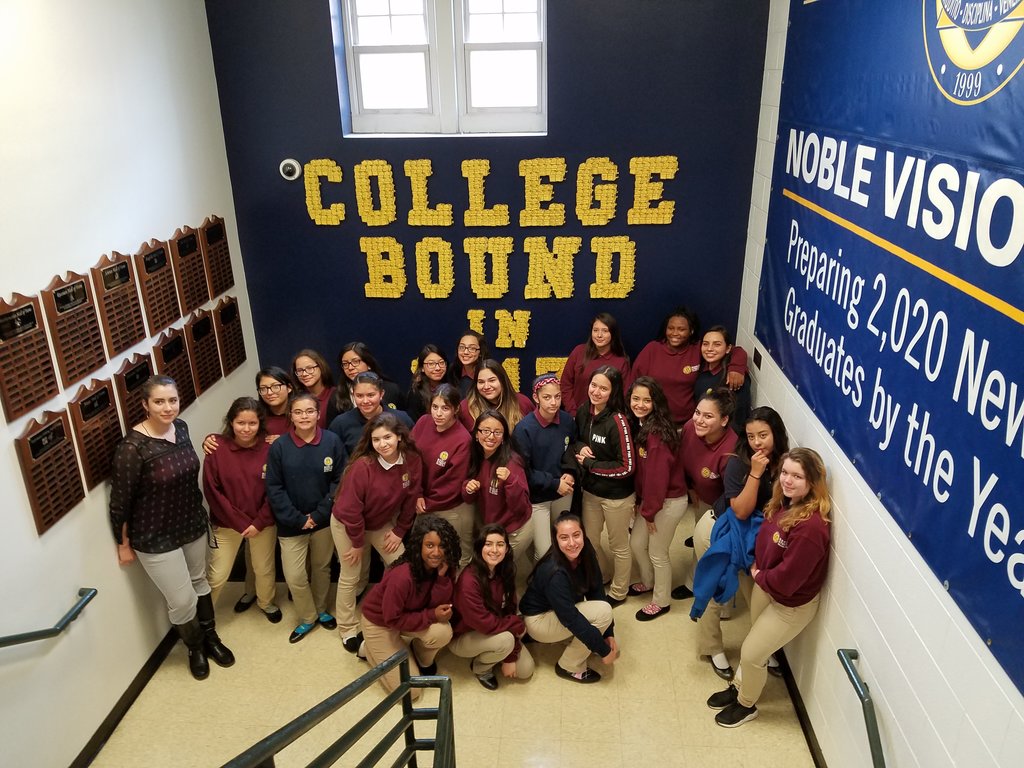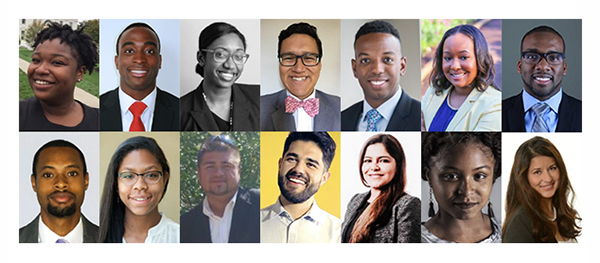Emilio Pack — Not All College Degrees Are Created Equal: How STEM Prep Is Preparing Its High Schoolers for the 21st-Century Economy

Dr. Emilio Pack works with a student
The new goal charter networks have adopted — boosting the college graduation rate for their alumni — is a wise one. It’s definitely time to move past the short-sighted goal of only ensuring they win admittance into a college.
But in rushing to meet this new goal, it’s easy to overlook an awkward but important truth: Not all college degrees produce success for our students. What they major in may matter as much as winning a degree.
Let’s review the history behind this new goal.
At Alliance College-Ready Public Schools in Los Angeles, where I served as a founding principal and director of New School Development, the network initially focused on high school graduation rates as an organizational priority. Progress toward this goal was quick and measurable. Today, several Alliance high schools boast impressive graduation rates of 100 percent.
Almost immediately the measure of success shifted to the percentage of students accepted into a four-year university. Again, Alliance rose to the challenge, and now 95 percent of its students who graduate from high school go on to college. The overwhelming majority of these students are minorities and come from low-income households. However, like many other districts and charter organizations across the country, these students are struggling to complete their degrees within six years. Many do not complete them at all.
Not surprisingly, charters are now shifting their resources and strategic planning to address this issue. Every charter colleague I have spoken to is steadfast in their commitment to increase college graduation rates.
But is this the right approach?
Or, like the goals of high school graduation and college acceptance before it, will we quickly realize that college graduation doesn’t guarantee success? These are the very questions that we asked ourselves in founding, developing, and operating my current organization, STEM Prep Schools.
If a district or organization succeeded in attaining 100 percent college graduation within four years it would be as noteworthy an academic accomplishment as any. However, practically speaking, all college degrees are not made equal, and in today’s job market, if these college graduates had degrees composed of Chicano studies, philosophy, communications, and psychology, shouldn’t we be a little concerned about their future employment opportunities?
I don’t want to disparage anyone with these majors. I was actually a psychology major myself and know firsthand that getting a job was a struggle. A four-year college degree in no way guarantees long-term success and employment.
In fact, we see thousands of students graduate with massive debt and unable to secure a high-quality job. This can be absolutely crippling for a family living at, or on the fringes of, severe poverty.
At STEM Prep Schools we believe it’s not just about getting a degree but rather does that degree open a pathway for what comes next for these graduates. We will fall short of making the economic and social changes necessary to disrupt the current status quo, a system that locks poor students of color out of the job sector, if we do not make a conscious effort to expose minority students to STEM (science, technology, engineering, and math) early on. STEM is the fastest-growing job sector, offers some of the highest pay, and desperately needs diversity.
Approximately 84 percent of the STEM workforce in the U.S. are white and Asian males, which means only 16 percent of the remaining workforce is African American, Latino, and/or female, combined. At STEM Prep Schools, we are setting our bar at the number of students who graduate college with a STEM degree and become professionals in a STEM-related field.
In order to accomplish our mission, we are developing in our students the research and inquiry skills necessary to be successful STEM professionals. We are exposing students to rigorous inquiry-based courses and lessons where they are able to explore the content on their own, be allowed to productively fail, and use their critical thinking and research skills to investigate or solve a problem/scenario.
Additionally, high school students engage in an elective course of study that includes engineering, biomedicine, and computer science. Other aspects of our model include industry internships and exposure to industry mentors who look like the kids we serve, African American and Latino.
We do all of this because we are not just an educational institution but also one that believes in fighting for social equity.
While STEM has become a bit of a cliché in education, make no mistake — this is the future of the job market. A future that looks awfully bleak for students of color and those living in poverty unless we boldly raise the bar for measuring success.
Emilio Pack is founder and CEO of STEM Prep Schools in Los Angeles. A video interview of Pack discussing his work can be found at The Founders.
Your Alumni
Story Here
We Recommend
-
Noble Network of Charter Schools: It’s Not Just About Going to College, It’s Also About Leaving to Learn Outside Chicago
-
King & Peiser: College Completion — Charter Schools as Laboratories
-
Q&A With UNCF CEO Michael Lomax: We’ve Got to Garner More Resources for Low-Income Kids for This Journey “To and Through” College
-
Gilchrist: My Charter School Saved My Life
-
Exclusive: Data Show Charter School Students Graduating From College at Three to Five Times National Average
-
WATCH: At Newark’s North Star Academy, 100% of the Class of 2017 Is Going to College
-
WATCH – The Alumni Tell Their Stories: College Gave Jadah Quick Upward Mobility
-
The Data Behind The Alumni: Unbundling Facts, Figures, and Caveats











